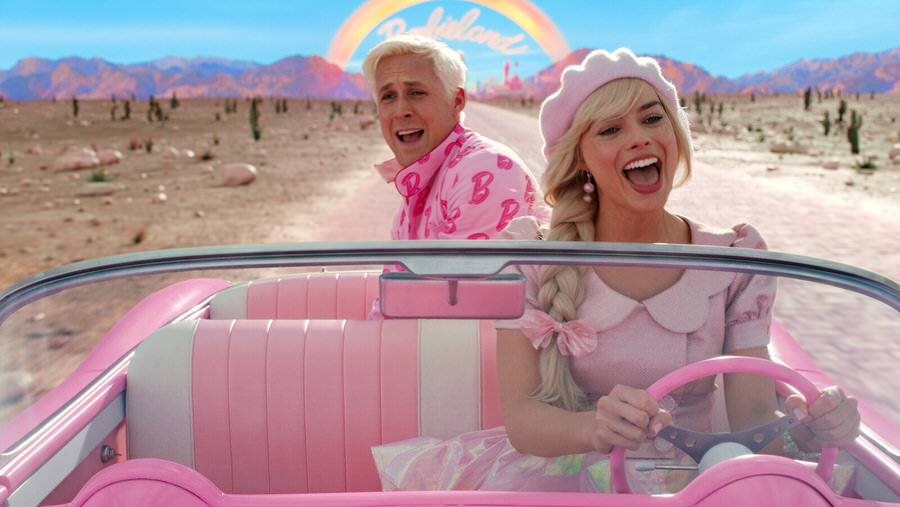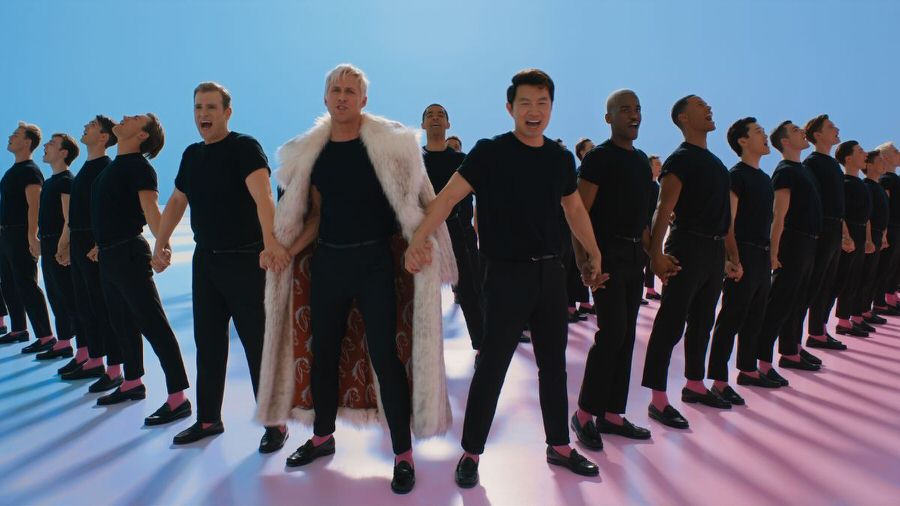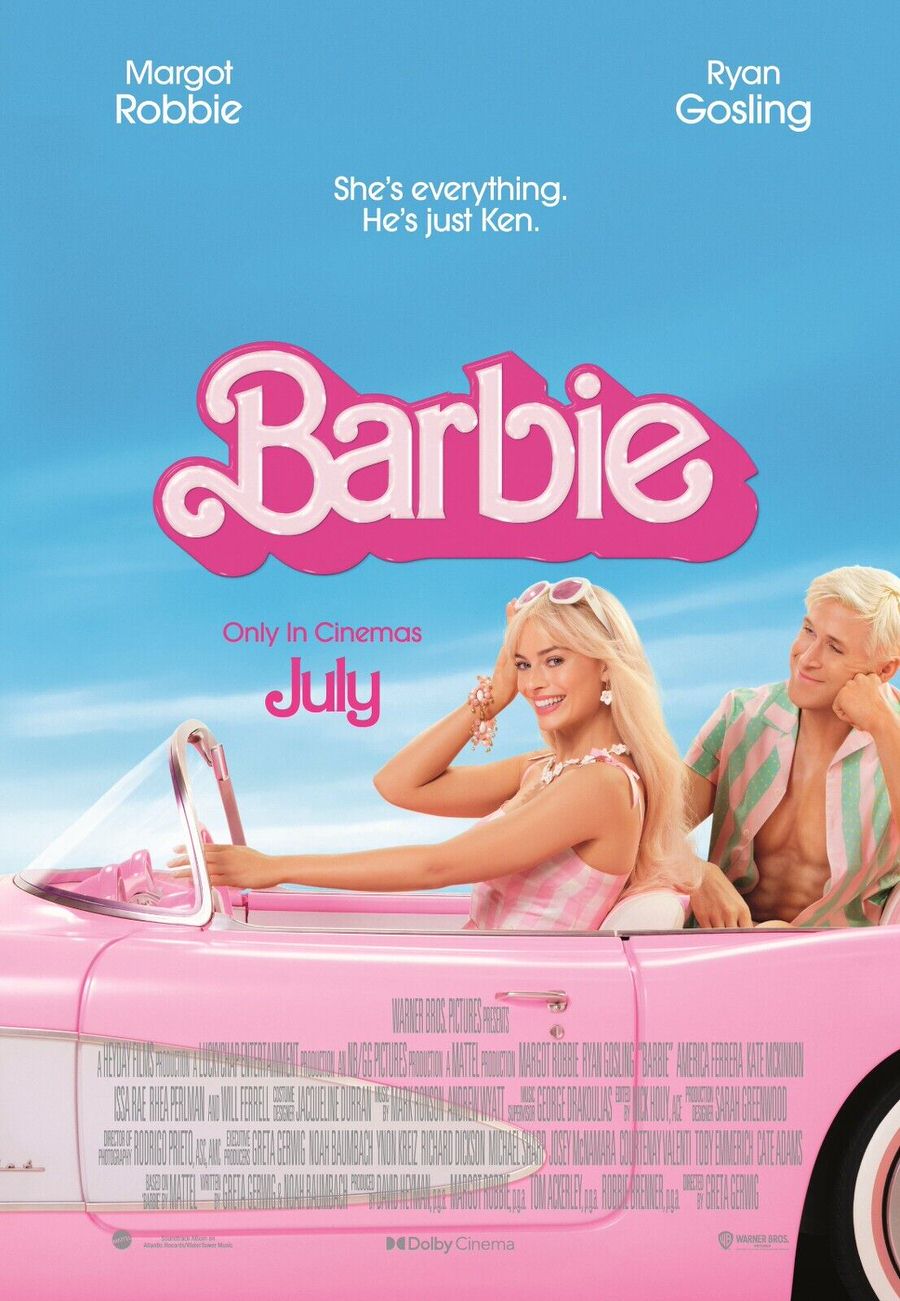Barbie
Directed by Greta Gerwig (2023) ***
Interest in a movie about the Mattel toy Barbie has long been percolating. I remember discussing the upcoming movie with a mother at a garage sale, pre-pandemic. Her young daughter couldn’t wait for the film to be released.
 She had a wait. Four years later, the final product has become a cultural phenomenon (helped by its release the same day as Christopher Nolan’s Oppenheimer, spurring Barbenheimer cosplay and group viewings that starved movie theaters were no doubt grateful for).
She had a wait. Four years later, the final product has become a cultural phenomenon (helped by its release the same day as Christopher Nolan’s Oppenheimer, spurring Barbenheimer cosplay and group viewings that starved movie theaters were no doubt grateful for).
Is viewing Barbie in a theater worth the hype? Mostly, yes. After the property going through the hands of many potential creatives, it finally ended up with critically acclaimed director Greta Gerwig (and co-writer Noah Baumbach), both known for smart, challenging, often contrary material. Gerwig and Baumbach delve deeply into the merchandising of the doll, first brought to the U.S. market in 1959 and based on a German doll, Bild Lilli, itself based on a comic strip and mostly purchased, at first, by adult men. The screenplay also smartly becomes meta, involving the Mattel corporation and, eventually and poignantly, Barbie’s real-life creator, Ruth Handler.
Barbie begins with a hilarious tribute to/parody of Stanley Kubrick’s Dawn of Man opening for 2001: A Space Odyssey, seemingly using the same footage utilizing photographs taken in Southwest Africa.  Preceding this is the same recording Kubrick himself used of ultra-modernist composer György Ligeti. Any comedy that begins with Ligeti is one you know will deliver something different. (One frequently patronizing film critic — I’ll spare his name — was concerned that Barbie is too smart for its target audience; I believe young adults are, in general, smarter than he believes.)
Preceding this is the same recording Kubrick himself used of ultra-modernist composer György Ligeti. Any comedy that begins with Ligeti is one you know will deliver something different. (One frequently patronizing film critic — I’ll spare his name — was concerned that Barbie is too smart for its target audience; I believe young adults are, in general, smarter than he believes.)
Margot Robbie (cast to perfection) plays Stereotypical Barbie, the ur-Barbie in a society of Barbies who live in Barbieland. Barbieland is a hoot, a pink and blue drenched fantasyland highly indebted to the Y2K aesthetic made so popular on TikTok and Instagram in the last many years. In Barbieland, every day is a perfect day, a colorful, fun, music-filled extravaganza, especially if you’re female. The male dolls (played upfront by a very funny Ryan Gosling as Ken and Simu Liu, late of Shang-Chi and the Legend of the Ten Rings, as Rival Ken) are relegated to the sidelines. In Barbieland, everything revolves around Barbie.
Things begin to go awry when Barbie has unexpected thoughts of death. She seeks answers from a Barbie usually shunned: Weird Barbie, a disfigured toy played by Kate McKinnon, channeling Daryl Hannah’s Pris,  a doll-like replicant holding a doll’s head in Ridley Scott’s Blade Runner. Barbie learns the answer to her problems lie in the real world. The movie then becomes an odyssey.
a doll-like replicant holding a doll’s head in Ridley Scott’s Blade Runner. Barbie learns the answer to her problems lie in the real world. The movie then becomes an odyssey.
Among the funniest twists the film takes is Ken’s mind-blowing discovery that a patriarchal society can exist, resulting in an obsession with riding horses and anything else he perceives as being manly. Also wonderful is a West Side Story-like dance fight between Ken and Rival Ken, a full-blown musical production. Gerwig and Baumbach put their knowledge of cinematic history here to splendid use. There are references and homages to the Matrix and Jacques Tati’s Playtime and the ’60s musicals of French director Jacques Demy. Ken and Barbie’s journeys are represented with flat props ala the late 1890s films of Georges Méliès. Gerwig even mentioned in an article that the camerawork was inspired by Max Ophül’s 1953 The Earrings of Madame de… I believe it.
 Drawbacks: There are a few, but none are dealbreakers. It’s unfortunate that a story about a doll designed for young children isn’t really appropriate for young children, due to its subject matter and language. Barbie works hard to create some plot points that, in the end, don’t really go anywhere (especially Will Ferrell’s role as the head of Mattel.) Barbie can also get preachy in places, breaking the important rule of telling instead of showing; a long monologue stops the story with ideological fervor. Without the unavoidable gender politics, though, we wouldn’t have this choice Ken line: “And the Nobel Prize for horses goes to Ken!”
Drawbacks: There are a few, but none are dealbreakers. It’s unfortunate that a story about a doll designed for young children isn’t really appropriate for young children, due to its subject matter and language. Barbie works hard to create some plot points that, in the end, don’t really go anywhere (especially Will Ferrell’s role as the head of Mattel.) Barbie can also get preachy in places, breaking the important rule of telling instead of showing; a long monologue stops the story with ideological fervor. Without the unavoidable gender politics, though, we wouldn’t have this choice Ken line: “And the Nobel Prize for horses goes to Ken!”
Barbie also stars an amusing Helen Mirren as the narrator, Rhea Perlman as Ruth Handler, Michael Cera as Allan and America Ferrera as Gloria, a Mattel employee. Barbie has, notably, become the highest-grossing film ever released by Warner Bros. in their one-hundred-year history.
—Michael R. Neno, 2023 October 4